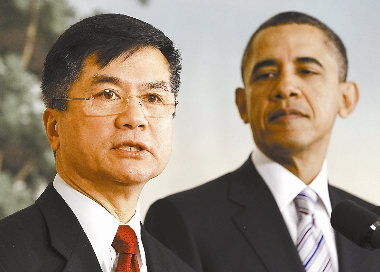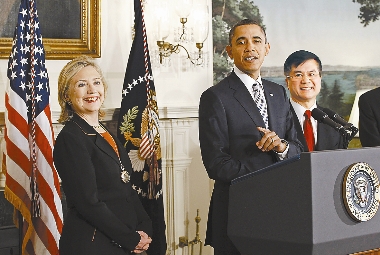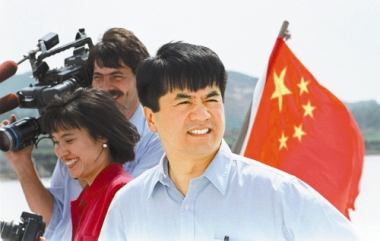

 U.S. Senators indicated they are likely to confirm Locke to replace Ambassador Jon Huntsman, who is leaving Beijing as he flirts with seeking the Republican nomination to challenge Obama for the presidency next year. In both public and private life, Locke has dealt closely with China. His efforts as Washington’s governor helped more than double the Pacific Northwest state’s exports to China to top US$5 billion per year. “I can think of nobody who is more qualified than Gary Locke,” Obama said. “Continued cooperation between our countries will be good for America. It will be good for China. And it will be good for the world,” Obama said. Locke’s appointment as U.S. ambassador to China marks a milestone for Asian Americans, but the Chinese may be in for a surprise if they think his ancestry makes him a natural ally. Locke, whom Barack Obama named Wednesday as the first Chinese-American to serve as U.S. ambassador to Beijing, boasts a rags-to-riches story of the sort loved by Americans. Flanked by Obama and Secretary of State Hillary Clinton, Locke said his father, who recently died, would have been “beaming with pride” at his appointment as ambassador. “I’m going back to the birthplace of my grandfather, my father, my mom and her side of the family. And I’ll be doing so as a devoted and passionate advocate for America, the country where I was born and raised,” Locke said. His grandfather arrived in the United States on a steamboat and served a family as a house-boy in exchange for English lessons. Locke himself grew up in Seattle’s Yesler Terrace — America’s first racially integrated housing project — and did not speak English until he entered school. Locke worked his way through Yale University and eventually became a prosecutor, the popular governor of Washington state and — since Obama took office in 2009 — the commerce secretary. Don Nakanishi, a professor and a friend of Locke since their student days at Yale, described the ambassador-designate as a “brilliant guy” who is “very quick on his feet” and open to befriending people of diverse backgrounds. Nakanishi, former director of the Asian American Studies Center at the University of California at Los Angeles, said the nomination “says a lot about President Obama and where U.S.-Asia relations have evolved.” “The whole history Asian Americans have had in this country is a long history of prejudice and the stereotype of foreignness, a question of whether they are true Americans and whether they can be trusted to represent American interests,” he said. “Clearly when taking all that into consideration and what this appointment of Gary Locke represents, I think that this is truly very, very historic,” he said. During World War II, the United States detained more than 100,000 Japanese-Americans due to suspicions over their loyalty, even if they were born and raised in the United States. Locke has three children, who he joked had “varying degrees” of enthusiasm about moving to China. His wife, Mona Lee Locke, is a television journalist related to Sun Yat-Sen, who became China’s first post-imperial leader in 1912 after the fall of the Qing Dynasty. Locke’s Chinese surname is Luo and he claims descent from the classic seventh-century poet Luo Binwang. The commerce secretary has been a favorite intermediary with Beijing, with the Obama administration often dispatching him to address events with visiting Chinese dignitaries. But Locke has also persistently, albeit diplomatically, pressed U.S. concerns about China’s economic policies including intellectual property rights and the value of yuan. And despite Locke’s Chinese heritage, he does not speak Mandarin — unlike outgoing Ambassador Jon Huntsman, who learned China’s national language as a Mormon missionary in Taiwan. Locke grew up speaking Taishanese, a dialect of southern China. One area where Locke’s heritage seems clear to prove an advantage is with ordinary Chinese. In 1997, hundreds lined the streets to greet Locke as he visited his ancestral village of Jilong in Guangdong Province — an extraordinary welcome for someone who was then a foreign governor. Locke burned incense, offered a roast pig and bowed before an ancestral grave. He observed to reporters at the time that the village lacked running water and flush toilets. “It’s like we are back in the 1800s,” he said after seeing the house where his parents had their wedding banquet. In a break with precedent, Locke received an invitation from China’s then president, Jiang Zemin. Locke said he used the occasion to encourage China to improve people’s rights — and to buy Boeing airplanes built in his home state. (SD-Agencies) U.S. Senators indicated they are likely to confirm Locke to replace Ambassador Jon Huntsman, who is leaving Beijing as he flirts with seeking the Republican nomination to challenge Obama for the presidency next year. In both public and private life, Locke has dealt closely with China. His efforts as Washington’s governor helped more than double the Pacific Northwest state’s exports to China to top US$5 billion per year. “I can think of nobody who is more qualified than Gary Locke,” Obama said. “Continued cooperation between our countries will be good for America. It will be good for China. And it will be good for the world,” Obama said. Locke’s appointment as U.S. ambassador to China marks a milestone for Asian Americans, but the Chinese may be in for a surprise if they think his ancestry makes him a natural ally. Locke, whom Barack Obama named Wednesday as the first Chinese-American to serve as U.S. ambassador to Beijing, boasts a rags-to-riches story of the sort loved by Americans. Flanked by Obama and Secretary of State Hillary Clinton, Locke said his father, who recently died, would have been “beaming with pride” at his appointment as ambassador. “I’m going back to the birthplace of my grandfather, my father, my mom and her side of the family. And I’ll be doing so as a devoted and passionate advocate for America, the country where I was born and raised,” Locke said. His grandfather arrived in the United States on a steamboat and served a family as a house-boy in exchange for English lessons. Locke himself grew up in Seattle’s Yesler Terrace — America’s first racially integrated housing project — and did not speak English until he entered school. Locke worked his way through Yale University and eventually became a prosecutor, the popular governor of Washington state and — since Obama took office in 2009 — the commerce secretary. Don Nakanishi, a professor and a friend of Locke since their student days at Yale, described the ambassador-designate as a “brilliant guy” who is “very quick on his feet” and open to befriending people of diverse backgrounds. Nakanishi, former director of the Asian American Studies Center at the University of California at Los Angeles, said the nomination “says a lot about President Obama and where U.S.-Asia relations have evolved.” “The whole history Asian Americans have had in this country is a long history of prejudice and the stereotype of foreignness, a question of whether they are true Americans and whether they can be trusted to represent American interests,” he said. “Clearly when taking all that into consideration and what this appointment of Gary Locke represents, I think that this is truly very, very historic,” he said. During World War II, the United States detained more than 100,000 Japanese-Americans due to suspicions over their loyalty, even if they were born and raised in the United States. Locke has three children, who he joked had “varying degrees” of enthusiasm about moving to China. His wife, Mona Lee Locke, is a television journalist related to Sun Yat-Sen, who became China’s first post-imperial leader in 1912 after the fall of the Qing Dynasty. Locke’s Chinese surname is Luo and he claims descent from the classic seventh-century poet Luo Binwang. The commerce secretary has been a favorite intermediary with Beijing, with the Obama administration often dispatching him to address events with visiting Chinese dignitaries. But Locke has also persistently, albeit diplomatically, pressed U.S. concerns about China’s economic policies including intellectual property rights and the value of yuan. And despite Locke’s Chinese heritage, he does not speak Mandarin — unlike outgoing Ambassador Jon Huntsman, who learned China’s national language as a Mormon missionary in Taiwan. Locke grew up speaking Taishanese, a dialect of southern China. One area where Locke’s heritage seems clear to prove an advantage is with ordinary Chinese. In 1997, hundreds lined the streets to greet Locke as he visited his ancestral village of Jilong in Guangdong Province — an extraordinary welcome for someone who was then a foreign governor. Locke burned incense, offered a roast pig and bowed before an ancestral grave. He observed to reporters at the time that the village lacked running water and flush toilets. “It’s like we are back in the 1800s,” he said after seeing the house where his parents had their wedding banquet. In a break with precedent, Locke received an invitation from China’s then president, Jiang Zemin. Locke said he used the occasion to encourage China to improve people’s rights — and to buy Boeing airplanes built in his home state. (SD-Agencies) U.S. Senators indicated they are likely to confirm Locke to replace Ambassador Jon Huntsman, who is leaving Beijing as he flirts with seeking the Republican nomination to challenge Obama for the presidency next year. In both public and private life, Locke has dealt closely with China. His efforts as Washington’s governor helped more than double the Pacific Northwest state’s exports to China to top US$5 billion per year. “I can think of nobody who is more qualified than Gary Locke,” Obama said. “Continued cooperation between our countries will be good for America. It will be good for China. And it will be good for the world,” Obama said. Locke’s appointment as U.S. ambassador to China marks a milestone for Asian Americans, but the Chinese may be in for a surprise if they think his ancestry makes him a natural ally. Locke, whom Barack Obama named Wednesday as the first Chinese-American to serve as U.S. ambassador to Beijing, boasts a rags-to-riches story of the sort loved by Americans. Flanked by Obama and Secretary of State Hillary Clinton, Locke said his father, who recently died, would have been “beaming with pride” at his appointment as ambassador. “I’m going back to the birthplace of my grandfather, my father, my mom and her side of the family. And I’ll be doing so as a devoted and passionate advocate for America, the country where I was born and raised,” Locke said. His grandfather arrived in the United States on a steamboat and served a family as a house-boy in exchange for English lessons. Locke himself grew up in Seattle’s Yesler Terrace — America’s first racially integrated housing project — and did not speak English until he entered school. Locke worked his way through Yale University and eventually became a prosecutor, the popular governor of Washington state and — since Obama took office in 2009 — the commerce secretary. Don Nakanishi, a professor and a friend of Locke since their student days at Yale, described the ambassador-designate as a “brilliant guy” who is “very quick on his feet” and open to befriending people of diverse backgrounds. Nakanishi, former director of the Asian American Studies Center at the University of California at Los Angeles, said the nomination “says a lot about President Obama and where U.S.-Asia relations have evolved.” “The whole history Asian Americans have had in this country is a long history of prejudice and the stereotype of foreignness, a question of whether they are true Americans and whether they can be trusted to represent American interests,” he said. “Clearly when taking all that into consideration and what this appointment of Gary Locke represents, I think that this is truly very, very historic,” he said. During World War II, the United States detained more than 100,000 Japanese-Americans due to suspicions over their loyalty, even if they were born and raised in the United States. Locke has three children, who he joked had “varying degrees” of enthusiasm about moving to China. His wife, Mona Lee Locke, is a television journalist related to Sun Yat-Sen, who became China’s first post-imperial leader in 1912 after the fall of the Qing Dynasty. Locke’s Chinese surname is Luo and he claims descent from the classic seventh-century poet Luo Binwang. The commerce secretary has been a favorite intermediary with Beijing, with the Obama administration often dispatching him to address events with visiting Chinese dignitaries. But Locke has also persistently, albeit diplomatically, pressed U.S. concerns about China’s economic policies including intellectual property rights and the value of yuan. And despite Locke’s Chinese heritage, he does not speak Mandarin — unlike outgoing Ambassador Jon Huntsman, who learned China’s national language as a Mormon missionary in Taiwan. Locke grew up speaking Taishanese, a dialect of southern China. One area where Locke’s heritage seems clear to prove an advantage is with ordinary Chinese. In 1997, hundreds lined the streets to greet Locke as he visited his ancestral village of Jilong in Guangdong Province — an extraordinary welcome for someone who was then a foreign governor. Locke burned incense, offered a roast pig and bowed before an ancestral grave. He observed to reporters at the time that the village lacked running water and flush toilets. “It’s like we are back in the 1800s,” he said after seeing the house where his parents had their wedding banquet. In a break with precedent, Locke received an invitation from China’s then president, Jiang Zemin. Locke said he used the occasion to encourage China to improve people’s rights — and to buy Boeing airplanes built in his home state. (SD-Agencies) Gary LockeAge: 61, born in Seattle Experience: King County deputy prosecutor, 1976-80; Washington state lawmaker, 1982-93; King County executive, 1994-97; Washington governor, 1997-2005; partner, Davis Wright Tremaine law firm, 2005-2009; secretary of commerce, 2009-present Education: Bachelor’s degree, Yale University, 1972; law degree, Boston University, 1975 Family: Wife, Mona Lee Locke; three children | 
